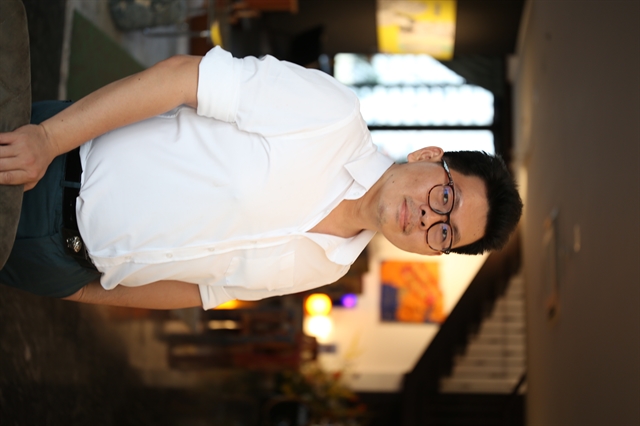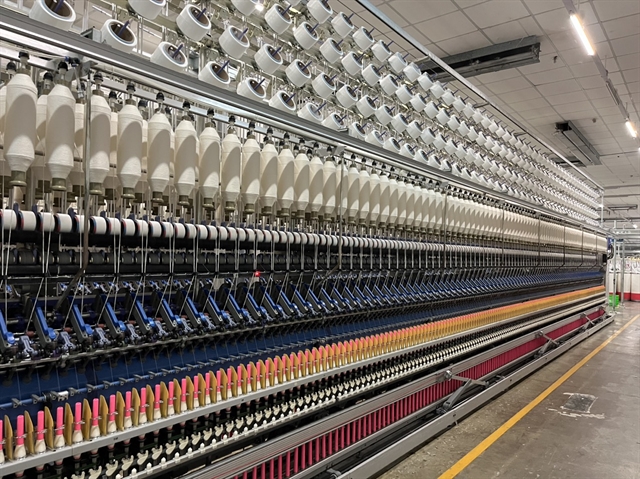Weather:
- Ha Noi 18oC
- Da Nang 22oC
- Ho Chi Minh 27oC
by Thu Ngân

Quách Kiến Lân, alias Dave Quách, 41, founded the Bảo Lân Textile Co, Ltd in 2011 with a pioneering vision to become an environment-friendly fabric supplier in Việt Nam. His sustainability philosophy was nurtured over more than 10 years living and studying macroeconomics at Massey University in New Zealand. Việt Nam News speaks with Lân about his journey in the industry.
Inner Sanctum: Could you introduce yourself and elaborate on your entry into the textile market?
My parents started a textile business before I was born, and so I grew up surrounded by fabrics and weaving machines. At 16, I moved to New Zealand to study. I had little to do with textiles during my 10 years in New Zealand. After I finished university my parents were unwell and asked me to return to help with the family business.
My 10 years in New Zealand made a big impact on my life and embedded deeply in me the mindset of community building and protection of nature.
I saw there were a lot of new developments and they all had some sort of sustainability angle. I realised that the textile industry more than meets the eye, and it made me decide to start my own company.
I wanted to build Bảo Lân Textile as an innovative company, but I did not have a clear idea about how. Motivated by Professor Greg Clydesdale, who taught creativity, innovation and entrepreneurship at Massey University in New Zealand, I was trying to build a sustainability driven textile company with a horizontal management system to nurture creativity and innovation that not only cares about the customers but also the consumer environment and community.
My university colleague Bonnie, now my wife, gave me a lot of support, advice and motivation, and helped me set up connections with sustainable yarn manufacturers.
The first success of Bảo Lân was in making melange, recycled melange, and colour melange yarn available and popular in Việt Nam. Our next achievement was introducing siro yarn, space dye yarn and one-part dye yarn, which helped fabric producers create more desire to affect the fabric and they don’t need to dye the fabric, all these yarns are considered eco because they used less dyeing colour and chemical to dye the yarn.
Following that success, we introduced Gy19 which turned out to be our biggest failure due to overconfidence. This struggle lasted over a year and led us to start our fabric division, W.ELL Fabric. While working on making new fabrics we realised the need for proactive R&D. So we began to do more research and study where the fashion industry was heading.
We have developed and released Bamboo Biocell, a bamboo yarn produced in Việt Nam, which helps us be proactive in R&D and gives us more control over the quality of yarn and pricing.
Currently we are focused on the Ananas project to make fabric from agricultural waste from pineapple leaf.
After three years of trying we have successfully processed yarn and fabric from pineapple leaf that are used in fashion on an industrial scale.

Inner Sanctum: How do you envision the growth of the Vietnamese fabric industry, and what are the competitive advantages of Vietnamese textiles?
Việt Nam's textile industry has a unique competitive advantage due to favourable FDI policies, attracting international manufacturers, engineers, new technology, and key customers. While Việt Nam is now a key sourcing hub for global brands, production costs remain a challenge. Only companies meeting international standards will benefit from future orders.
Being active in eco textiles, I see that Việt Nam has a very positive image among international brands, we are the third biggest textiles and garment exporter in the world and we did a good job regarding sustainability.
As for Việt Nam, I can see a clear increase in certified textile manufacturers, and their mindset shifting towards sustainability from “it is a costly thing to do” to “it can bring new opportunities”.
Some of them even have a sustainability department, and, in addition, the range of eco yarns and fabrics are increasing in the market and prices have become more competitive than before.
On top of that, fashion brands have increased their footprint in Việt Nam with more opening offices in Việt Nam and searching for greener textiles.
Inner Sanctum: Could you tell us about your current and future plans?
Ananas just got released recently, it is very new and needs more development as there are still many limitations and imperfections. We're going to do more R&D to improve the quality of the raw materials and also find solutions to make the Ananas process more efficient to lower the price so that it is beneficial to everyone.
Our goals and ambitions for Ananas textiles are to increase its uses and the range of mix with more materials to increase its properties and functions, and at the same time promote Ananas to become a Vietnamese textile and fashion icon so that when people think about Vietnamese eco-textiles they will think about Ananas.
Besides Ananas, we also have Bamboo Biocell that is going to have an update, we will have more development products range and implement it in a wide range of market segments. We will collaborate with traditional silk fabric manufacturers in Việt Nam to create a new direction for Vietnamese silk cloth, starting with Lãnh Mỹ A.
We are also developing other new products and projects to increase the choice of eco yarns and fabrics for the Việt Nam textile industry such as recycled jeans, functional fibres to increase blood flow for better health, and anti-odour for the comfort and confidence of seniors, and more. VNS


